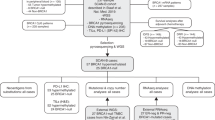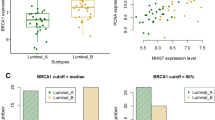Abstract
Aberrant DNA methylation in the BRCA1 promoter region causes epigenetic silencing of BRCA1 gene expression, which is critical for breast cancer development. However, how BRCA1 promoter methylation status alters histological features remains poorly understood. Here, we investigated the possibility to predict BRCA1 promoter methylation status based on the morphological and immunohistochemical features of triple-negative breast cancers (TNBCs). The morphological features of 53 TNBCs were evaluated with hematoxylin-eosin staining, with immunohistochemical staining of BRCA1, androgen receptor, p53, cytokeratin 5/6, and epidermal growth factor receptor. BRCA1 promoter methylation status was used to distinguish BRCA1 promoter-methylated tumors (BPMTs) from BRCA1 promoter-unmethylated tumors (BPUTs) dependent on pathological characteristics. BPMTs comprised approximately 26% of the TNBCs. Immunohistochemical analysis found that BRCA1 protein expression was significantly lower in BPMT compared with BPUT (p = 0.016). Morphologically, BPMTs were associated with high mitotic index (p = 0.017), pushing margin (p = 0.017), a circumscribed growth pattern (p = 0.014), and a syncytial growth pattern (p = 0.034) compared with BPUTs. We then assessed the potential of predicting BRCA1 promoter methylation status by using published score systems based on these morphological characteristics. A receiver operating characteristic analysis showed an area under the curve of 0.80. This study found that BRCA1 promoter methylation status could be derived from morphological features and lower BRCA1 expression of TNBCs, which may help identify suitable cases for target treatment with PARP inhibitors.
This is a preview of subscription content, access via your institution
Access options
Subscribe to this journal
Receive 12 print issues and online access
$259.00 per year
only $21.58 per issue
Buy this article
- Purchase on Springer Link
- Instant access to full article PDF
Prices may be subject to local taxes which are calculated during checkout




Similar content being viewed by others
References
Lynch HT, Lynch J, Conway T, Watson P, Feunteun J, Lenoir G, et al. Hereditary breast cancer and family cancer syndromes. World J Surg. 1994;18:21–31.
Hill AD, Doyle JM, McDermott EW, O’Higgins NJ. Hereditary breast cancer. Br J Surg. 1997;84:1334–9.
Melchor L, Benitez J. The complex genetic landscape of familial breast cancer. Hum Genet. 2013;132:845–63.
Nik-Zainal S, Davies H, Staaf J, Ramakrishna M, Glodzik D, Zou X, et al. Landscape of somatic mutations in 560 breast cancer whole-genome sequences. Nature. 2016;534:47–54.
Winter C, Nilsson MP, Olsson E, George AM, Chen Y, Kvist A, et al. Targeted sequencing of BRCA1 and BRCA2 across a large unselected breast cancer cohort suggests that one-third of mutations are somatic. Ann Oncol. 2016;27:1532–8.
Robson M, Goessl C, Domchek S. Olaparib for metastatic germline BRCA-mutated breast cancer. N Engl J Med. 2017;377:1792–3.
Couch FJ, Shimelis H, Hu C, Hart SN, Polley EC, Na J, et al. Associations between cancer predisposition testing panel genes and breast cancer. JAMA Oncol. 2017;3:1190–6.
Lord CJ, Ashworth A. BRCAness revisited. Nat Rev Cancer. 2016;16:110–20.
Turner N, Tutt A, Ashworth A. Hallmarks of ‘BRCAness’ in sporadic cancers. Nat Rev Cancer. 2004;4:814–9.
Esteller M, Silva JM, Dominguez G, Bonilla F, Matias-Guiu X, Lerma E, et al. Promoter hypermethylation and BRCA1 inactivation in sporadic breast and ovarian tumors. J Natl Cancer Inst. 2000;92:564–9.
Rice JC, Ozcelik H, Maxeiner P, Andrulis I, Futscher BW. Methylation of the BRCA1 promoter is associated with decreased BRCA1 mRNA levels in clinical breast cancer specimens. Carcinogenesis. 2000;21:1761–5.
Catteau A, Harris WH, Xu CF, Solomon E. Methylation of the BRCA1 promoter region in sporadic breast and ovarian cancer: correlation with disease characteristics. Oncogene. 1999;18:1957–65.
Lips EH, Mulder L, Oonk A, van der Kolk LE, Hogervorst FBL, Imholz ALT, et al. Triple-negative breast cancer: BRCAness and concordance of clinical features with BRCA1-mutation carriers. Br J Cancer. 2013;108:2172–7.
Silver DP, Richardson AL, Eklund AC, Wang ZC, Szallasi Z, Li Q, et al. Efficacy of neoadjuvant Cisplatin in triple-negative breast cancer. J Clin Oncol. 2010;28:1145–53.
Drew Y, Mulligan EA, Vong WT, Thomas HD, Kahn S, Kyle S, et al. Therapeutic potential of poly(ADP-ribose) polymerase inhibitor AG014699 in human cancers with mutated or methylated BRCA1 or BRCA2. J Natl Cancer Inst. 2011;103:334–46.
Garg K, Levine DA, Olvera N, Dao F, Bisogna M, Secord AA, et al. BRCA1 immunohistochemistry in a molecularly characterized cohort of ovarian high-grade serous carcinomas. Am J Surg Pathol. 2013;37:138–46.
Sun C, Li N, Ding D, Weng D, Meng L, Chen G, et al. The role of BRCA status on the prognosis of patients with epithelial ovarian cancer: a systematic review of the literature with a meta-analysis. PLoS ONE. 2014;9:e95285.
Al-Mulla F, Abdulrahman M, Varadharaj G, Akhter N, Anim JT. BRCA1 gene expression in breast cancer: A correlative study between real-time RT-PCR and immunohistochemistry. J Histochem Cytochem. 2005;53:621–9.
Xie Y, Gou Q, Wang Q, Zhong X, Zheng H. The role of BRCA status on prognosis in patients with triple-negative breast cancer. Oncotarget. 2017;8:87151–62.
Farshid G, Balleine RL, Cummings M, Waring P. Kathleen Cuningham Consortium for Research into Familial Breast Cancer (kConFab) Morphology of breast cancer as a means of triage of patients for BRCA1 genetic testing. Am J Surg Pathol. 2006;30:1357–66.
Southey MC, Ramus SJ, Dowty JG, Smith LD, Tesoriero AA, Wong EEM, et al. Morphological predictors of BRCA1 germline mutations in young women with breast cancer. Br J Cancer. 2011;104:903–9.
Eerola H, Heikkila P, Tamminen A, Aittomaki K, Blomqvist C, Nevanlinna H. Histopathological features of breast tumours in BRCA1, BRCA2 and mutation-negative breast cancer families. Breast Cancer Res. 2005;7:93.
Rakha EA. Basal-like breast cancer: a critical review. J Clin Oncol. 2008;26:2568; 2568–81; 2581.
Zhang L, Long X. Association of BRCA1 promoter methylation with sporadic breast cancers: evidence from 40 studies. Sci Rep. 2015;5:17869.
Matros E, Wang Z, Lodeiro G, Miron A, Iglehart JD, Richardson AL. BRCA1 promoter methylation in sporadic breast tumors: relationship to gene expression profiles. Breast Cancer Res Treat. 2005;91:179–86.
Wolff AC, Hammond ME, Hicks DG, Dowsett M, McShane LM, Allison KH, et al. Recommendations for human epidermal growth factor receptor 2 testing in breast cancer: American Society of Clinical Oncology/College of American Pathologists clinical practice guideline update. J Clin Oncol. 2013;31:3997–4013.
Lakhani SR, Van De Vijver MJ, Jacquemier J, Anderson TJ, Osin PP, McGuffog L, et al. The pathology of familial breast cancer: predictive value of immunohistochemical markers estrogen receptor, progesterone receptor, HER-2, and p53 in patients with mutations in BRCA1 and BRCA2. J Clin Oncol. 2002;20:2310–8.
Ridolfi RL, Rosen PP, Port A, Kinne D, Mike V. Medullary carcinoma of the breast: a clinicopathologic study with 10 year follow-up. Cancer. 1977;40:1365–85.
McNamara KM, Yoda T, Takagi K, Miki Y, Suzuki T, Sasano H. Androgen receptor in triple negative breast cancer. J Steroid Biochem Mol Biol. 2013;133:66–76.
Fountzilas G, Giannoulatou E, Alexopoulou Z, Zagouri F, Timotheadou E, Papadopoulou K, et al. TP53 mutations and protein immunopositivity may predict for poor outcome but also for trastuzumab benefit in patients with early breast cancer treated in the adjuvant setting. Oncotarget. 2016;7:32731–53.
Lesnock JL, Darcy KM, Tian C, DeLoia JA, Thrall MM, Zahn C, et al. BRCA1 expression and improved survival in ovarian cancer patients treated with intraperitoneal cisplatin and paclitaxel: a Gynecologic Oncology Group Study. Br J Cancer. 2013;108:1231–7.
Nielsen TO, Hsu FD, Jensen K, Cheang M, Karaca G, Hu Z, et al. Immunohistochemical and clinical characterization of the basal-like subtype of invasive breast carcinoma. Clin Cancer Res. 2004;10:5367–74.
Meisel JL, Hyman DM, Garg K, Zhou Q, Dao F, Bisogna M, et al. The performance of BRCA1 immunohistochemistry for detecting germline, somatic, and epigenetic BRCA1 loss in high-grade serous ovarian cancer. Ann Oncol. 2014;25:2372–8.
Brianese RC, de Mello Nakamura KD, de Almeida FGDSR, Ramalho RF, de Figueiredo Barros BD, Ferreira ENE. et al. BRCA1 deficiency is a recurrent event in early-onset triple-negative breast cancer: a comprehensive analysis of germline mutations and somatic promoter methylation. Breast Cancer Res Treat. 2018;167:803–14.
Dworkin AM, Spearman AD, Tseng SY, Sweet K, Toland AE. Methylation not a frequent “second hit” in tumors with germline BRCA mutations. Fam Cancer. 2009;8:339–46.
Foedermayr M, Sebesta M, Rudas M, Berghoff AS, Promberger R, Preusser M, et al. BRCA-1 methylation and TP53 mutation in triple-negative breast cancer patients without pathological complete response to taxane-based neoadjuvant chemotherapy. Cancer Chemother Pharmacol. 2014;73:771–8.
Xu Y, Diao L, Chen Y, Liu Y, Wang C, Ouyang T, et al. Promoter methylation of BRCA1 in triple-negative breast cancer predicts sensitivity to adjuvant chemotherapy. Ann Oncol. 2013;24:1498–505.
Stefansson OA, Villanueva A, Vidal A, Marti L, Esteller M. BRCA1 epigenetic inactivation predicts sensitivity to platinum-based chemotherapy in breast and ovarian cancer. Epigenetics. 2012;7:1225–9.
Tutt A, Tovey H, Cheang MCU, Kernaghan S, Kilburn L, Gazinska P, et al. Carboplatin in BRCA1/2-mutated and triple-negative breast cancer BRCAness subgroups: the TNT Trial. Nat Med. 2018;24:628–37.
Thompson ME. BRCA1 16 years later: nuclear import and export processes. FEBS J. 2010;277:3072–8.
Acknowledgements
We thank Aiko Nishimoto, Harumi Yamamura, and Kei Sakuma for their technical support. We are grateful to Dr. Reo Maruyama of the Cancer Institute of Japanese Foundation for Cancer Research for his helpful advice regarding the PCR products. We are indebted to Dr. Edward Barroga (https://orcid.org/0000–0002–8920–2607), Medical Editor, and Professor of Academic Writing at St. Luke’s International University, Tokyo, Japan, for reviewing and editing the manuscript. The authors acknowledge the assistance of Clear Science (www.clearscience.net) with the English language editing of this manuscript. Grants-in-aid supported this study for scientific research from the Japanese Foundation for Multidisciplinary Treatment of Cancer.
Author information
Authors and Affiliations
Corresponding author
Ethics declarations
Conflict of interest
The authors declare no competing interests.
Additional information
Publisher’s note Springer Nature remains neutral with regard to jurisdictional claims in published maps and institutional affiliations.
Supplementary information
Rights and permissions
About this article
Cite this article
Morizono, A., Tanabe, M., Ikemura, M. et al. Loss of BRCA1 expression and morphological features associated with BRCA1 promoter methylation status in triple-negative breast cancer. J Hum Genet 66, 785–793 (2021). https://doi.org/10.1038/s10038-021-00911-3
Received:
Revised:
Accepted:
Published:
Issue Date:
DOI: https://doi.org/10.1038/s10038-021-00911-3
This article is cited by
-
Methylation of promoter region of BRCA1 gene versus pathogenic variants of gene: risk factor or clinical marker of breast cancer
Breast Cancer Research and Treatment (2022)



